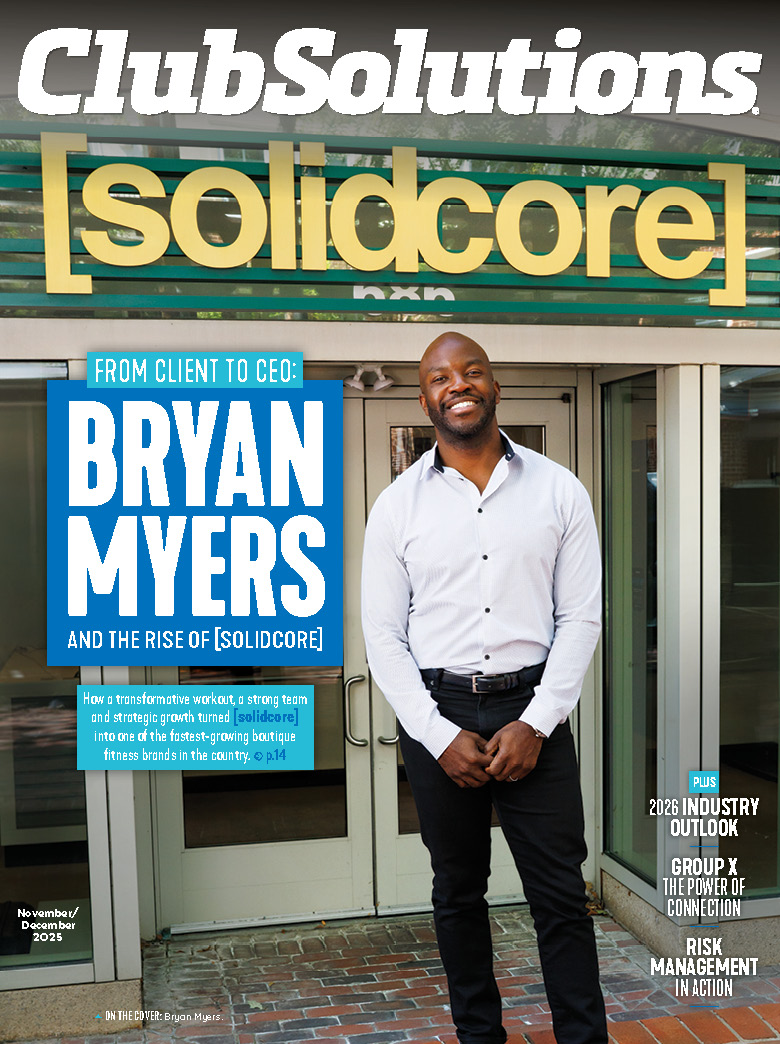How California Athletic Clubs has managed to maintain a local feel across seven locations in California and Utah.
People take pride in their local communities, and the businesses that reside in them are a big component. But as a chain, it can be hard to maintain a feeling of tight-knit community across multiple locations.
This isn’t the case for California Athletic Clubs (CAC). Despite having seven locations in California and Utah, each individual club has maintained a local feel that makes it unique and special to the people it serves.
“We brand each location locally and have services and vendors that are local,” said Eric Schmitz, the president of CAC.
For example, the club in Ojai, California, is called Ojai Valley Athletic Club versus California Athletic Clubs Ojai. Inside, members will find beer, wine and sometimes even coffee from local distributors.
According to Ryan Gaston, the general manager of Ojai Valley Athletic Club, this customization creates a unique vibe that’s palatable.
“It’s always said here if you want to meet the Ojai community, join the Ojai Valley Athletic Club,” said Gaston. “We take pride in having all types of members and representing what our amazing town offers. It’s such a great social scene from hanging out at the pool to Friday night bands. I think people feel something special — that when they walk into the club they are going to connect with friends. The small-town vibe really shows throughout our club.”

Schmitz credits the ability to maintain this quality across all locations to the fact the brand is independently owned and operated.
“We don’t have any venture capital money involved in our operations,” said Schmitz. “I think this allows us to be truly authentic and keeps our key staff retention very high. We are not cookie cutter in the operations of each club.”
However, there is one thing consistent across all CAC locations, and that is culture.
CAC’s culture is built around five core values including Excellence, Passion, Integrity, Caring and Creativity. These values were developed during a leadership off-site meeting early on in the brand’s formation.
According to Nancy Terrell, the general manager of Avila Bay Athletic Club & Spa — a club in the CAC network located in Avila Beach, California — the fact employees had a hand in creating the core values has made them all the more powerful.
“We love to say [the values] were not created by a group in a corporate office,” said Terrell. “Instead, every employee was able to give feedback, and we chose the ones that fit us the best. After all these years, we find they still totally apply. When we have to make a hard decision, we go back to the values and usually find our answer right there.”
These core values are supported by a Values Blueprint and a Customer Service Blueprint, which outline specific behaviors team members are held accountable to.
In the Values Blueprint, examples of expected behaviors include, “Be truthful and ethical in all that you do,” “Follow through on what you say you are going to do,” and “Display open, honest and effective communication.”

The Customer Service Blueprint outlines expected behaviors in regards to serving customers, such as, “Be present and use their name throughout their visit,” “Connect authentically with their hearts and minds,” and “Smile, and use appropriate eye contact and body language.”
The core values and blueprints are not only stressed during the onboarding process, but are also used ongoing in an employee’s review process and to measure a club’s overall performance.
“Our review process is all based on the values,” explained Schmitz. “The general managers do monthly audits and I do quarterly ones as well. And then on the individual staffing level, we have the five values and ask, ‘Is this person in alignment or not?’”
According to Schmitz, this process is helpful in identifying people who aren’t a good fit for the organization culturally. “If you do have staff who aren’t in alignment with the values, I haven’t seen a time when it works out,” he said. “Our culture will weed out people who aren’t truly of service, because it becomes so apparent.”
MXMetrics’ (MXM) survey technology and net promoter scores are also key in measuring whether or not a club and its individual staff are meeting culture standards.
“One of the best things we do to provide great service is to learn how we are doing and what we can do better from our members filling out our MXM surveys,” explained Schmitz. “We have a process for the management teams to review the suggestions and implement what makes sense. By using MXM on a consistent basis, we are always trying to improve our service by 1% each day.”
In fact, two of CAC’s clubs — Avila Bay Athletic Club and Westlake Athletic Club in Westlake Village, California — are repeat Five Nines Winners. It’s an award given by MXM to clubs that achieve a trailing six-month average score of 9.0 in experience categories such as front desk staff friendliness, cleanliness and likelihood to recommend.
According to Terrell, whose gym was a recipient, the award is due in large part to her club’s tenured, hardworking staff — many of whom have been with the brand for close to a decade.

“I believe the key to great customer service starts with how we treat our staff,” said Terrell. “We interview very carefully and try hard to hire team members who will fit well with our culture. We want the staff to be happy, and in turn, they naturally spread happiness to the members. I am most proud of this award because we are basically a humble group. It is nice to be recognized for all the hard work and dedication from a team filled with longevity in working at the club. The average length of time our 10 department heads have worked at the club is 9.9 years.”
This is commonplace throughout the CAC organization. Schmitz credited staff retention to the positive culture and benefits such as medical and paid time off, including three weeks of vacation at the department-head level. He also pointed to employee autonomy in making decisions.
This is especially important for general managers, with each empowered to lead in the way that best works for their individual clubs. Again, this speaks to CAC’s desire to retain a local feel at each location.
“One of the things I really try to do as the sort of ‘director of the managers’ is give them a lot of autonomy to do what they need to do to make it locally authentic,” said Schmitz. “It’s super empowering for them and their staff of department heads.”
As the general manager of Ojai Valley Athletic Club, Gaston said his philosophy on leadership is to set a great example and ensure he’s attuned to his team’s needs.
“I think it’s very important for managers to walk the walk,” said Gaston. “I make sure to spend time in each department to see what employees go through and what their needs might be. Working a café is very challenging and you really don’t understand until you have been behind the counter on a busy weekend. Front desk staff have to be very informed as they get asked tons of questions from members. Working that department can be overwhelming when multiple people ask different things for you to do. Focus on communication within your staff. I think it’s important to do daily check-ins just to say hi and ask how they are doing.”
Beyond a great culture and hardworking teams at each location, CAC’s clubs also stand out through their unique, expansive locations with amenities such as tennis, swimming and racquet sports, and plenty of outdoor space for members to take advantage of.
According to Schmitz, he feels the outdoor fitness trend is here to stay, and the organization plans to lean in. The clubs had outdoor spaces prior to COVID-19. Since then, they have invested in these areas by installing permanent awnings, turf and equipment built for outdoor use.
“I think one of the top trends is people really want to be able to workout with and around others safely,” said Schmitz. “We really offer that for our members by the uniqueness of the outdoor areas we have.”

One particular outdoor activity that has boomed for CAC is pickleball, one of the fastest-growing sports in the U.S. The brand has offered pickleball at multiple locations for the past five years and has seen participation increase year over year.
According to Schmitz, the offering has added value to the club by providing an alternate activity to tennis players — many of whom also enjoy the sport — and expanding the club’s reach, with pickleball being more inclusive and attractive to a wider audience.
“It doesn’t have the stereotypical snooty culture of tennis,” said Schmitz. “It’s not this high-end skill level that’s needed to be really good at it and to have fun. It’s way more social.”
Ultimately though, it’s not outdoor fitness, pickleball or beautiful clubs that make CAC the success it is today. It all goes back to the brand’s culture centered around its core values that boil down to one thing: treating others with respect.
“Being nice in business can really help one move forward,” said Schmitz. “Caring is one of our core values and while it seems super simple, having the leadership team be in that place can make all the difference for the rest of the staff. This good energy of authentically caring, especially in today’s world, can make all the difference in the success of a business.”






![From Client to CEO: Bryan Myers and the Rise of [solidcore]](https://d296qbqev3kq48.cloudfront.net/wp-content/uploads/2025/11/06151333/CS-NovDec25-CoverStory-3-350x250.jpg)





Kudos to Eric and the entire CAC team. Very deserved recognition!